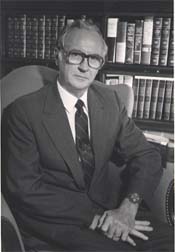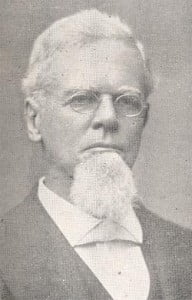 Today’s post looks at the life of G. Aiken Taylor, one of the founding fathers of the Presbyterian Church in America and a leading voice among conservative Presbyterians during the 1960’s and 1970’s
Today’s post looks at the life of G. Aiken Taylor, one of the founding fathers of the Presbyterian Church in America and a leading voice among conservative Presbyterians during the 1960’s and 1970’s
Very Much the Churchman
George Aiken Taylor was born on January 22, 1920 in Recife, Pernambuco, Brazil, the son of Presbyterian missionaries George W. Taylor and Julia Pratt Taylor. The influence of that upbringing was clearly manifest in later years, for one of Dr. Taylor’s adversaries once said of him, “Dr. Taylor was born of missionary parents in Brazil, and I happen to know that he is ‘not conscious of color…’”
When he was fifteen years old he returned to this country to complete his education, graduating from the Presbyterian College of South Carolina with the A.B. degree in 1940. He taught in the South Carolina public schools for a year, and then entered the U.S. Army in 1941. He served with the 36th (Texas) Infantry Division and rose to the rank of Captain, commanding a heavy weapons company in the 142nd Infantry. He participated in five major campaigns in World War II, was wounded once and decorated once.
Taylor married the former Blanche Williams of Chattanooga, Tennessee in 1942. Together they raised four children.
After the war, Taylor entered Columbia Theological Seminary in Decatur, Georgia, graduating with the Bachelor of Divinity degree, Magna Cum Laude in 1948. He was also ordained that same year and installed as pastor of the Smyrna Presbyterian Church in Smyrna, Georgia, where he served for two years before becoming pastor of the Northside Presbyterian Church in Burlington, North Carolina. In 1950 he entered Duke University for graduate study and was later awarded the Ph.D. degree by Duke for his dissertation, John Calvin, the Teacher, a study of religious education in Calvin’s Geneva.
Dr. Taylor served as pastor of First Presbyterian Church in Alexandria, Louisiana from 1954 to 1959, and during those years he became interested in the work of Alcoholics Anonymous through his own work with alcoholics, developing an appreciation for A.A.’s principles. His book, A Sober Faith, was one result of that work and was published in 1953. A second book, St. Luke’s Life of Jesus, was published in 1954.
When Dr. L. Nelson Bell stepped down as editor of The Southern Presbyterian Journal in 1959, it was Aiken Taylor who took on those duties, serving as editor until 1983. It is interesting to note that one of Dr. Taylor’s conditions for taking the job entailed a name change for the magazine, which now became simply The Presbyterian Journal. This name change was a reflection of Taylor’s own ecumenical aspirations. Taylor was instrumental in the formation of the National Presbyterian and Reformed Fellowship (NPRF), which in turn led to the formation of another conservative ecumenical organization, the North American Presbyterian & Reformed Council. During his tenure as editor, he was also active in the conservative movement within the Presbyterian Church, US (aka, Southern Presbyterian Church), an effort which eventually led to the formation of the Presbyterian Church in America (PCA) in 1973. Subsequently Taylor was a key leader in the PCA and was elected moderator of the General Assembly of that denomination in 1978.
In 1983, Dr. Taylor was named president of Biblical Theological Seminary in Hatfield, Pennsylvania, where he succeeded the founding president of the school, Dr. Allan A. MacRae. Taylor was inaugurated in December of that year, but just three months later—on March 6, 1984—he died suddenly. Memorial services were held in Pennsylvania, with funeral services at Gaither Chapel in Montreat, North Carolina. Dr. Taylor was buried in nearby Swannanoa, North Carolina.
Words to Live By:
I have been told that it was Francis Schaeffer who coined the phrase “split P’s” when speaking of all the many divisions among Presbyterians. But for all those divisions, the latter half of the twentieth century turned out to be largely a time of focus on union and cooperation. Among the conservative Presbyterian denominations, merger talks were actively underway between various groups from 1956 until about the close of the century. Sadly, since that time the silence has been deafening. Dr. Taylor had the right idea in forming the NPRF, where conservatives of all denominations could fellowship together and thus overcome distrust and distance. Leaving all talk of mergers entirely aside, for the cause of Christ we as conservative Presbyterians need to be creating opportunities to work and fellowship alongside one another. Some might say that the many para-church groups now provide this function, but is that really enough, and are they effective for this purpose?
For Further Study:
In his years as editor of The Presbyterian Journal, Dr. Taylor was no stranger to debate and even controversy. One of the more (in)famous incidents involved his editorial titled “Lo, the TR!” and the many responses that followed. Our readers may be familiar with the term “TR” but to get the full story in context, click here.


